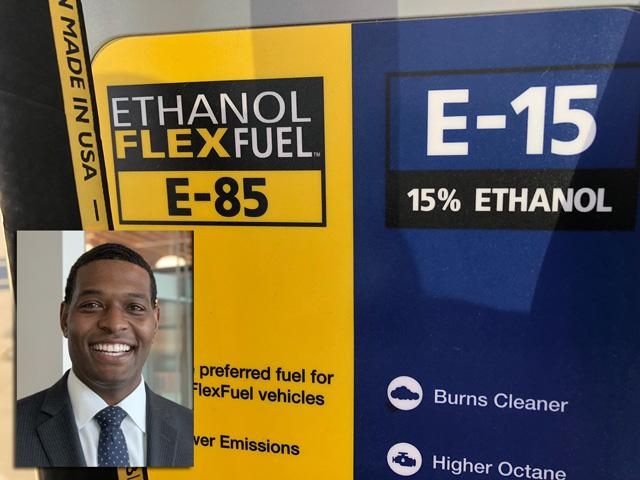EPA Chief Visits Iowa
Ethanol Plant Among First Tours for New EPA Administrator
OMAHA (DTN) -- In one of his first trips as head of the Environmental Protection Agency, Administrator Michael Regan met Tuesday with a group of Iowa ethanol producers who stressed the potential for biofuels lowering both emissions and cancer-causing chemicals.
Regan, along with Agriculture Secretary Tom Vilsack, toured the Lincolnway Energy ethanol plant near Nevada, Iowa, and hosted a roundtable discussion with ethanol producers. That part of Regan's visit to Iowa was closed to the press before Regan later visited a Superfund site in downtown Des Moines.
Regan later sent out a few tweets highlighting his biofuels tour. "Our agricultural community must have a seat at the table if we are to successfully tackle the climate crisis," Regan tweeted.
Agriculture Secretary Tom Vilsack also tweeted, "It was an honor to have @EPAMichaelRegan in Iowa today to hear from our agriculture and energy producers. Having an EPA administrator committed to listening and talking with farmers and producers of biofuels is a welcome development."
Monte Shaw, executive director of the Iowa Renewable Fuels Association, took part in the ethanol plant tour and "was kind of a fly on the wall" at the roundtable while ethanol producers spoke with Regan. Shaw told DTN in an interview that Regan was engaged, and the ethanol group was also keenly aware that the new administrator took an early trip to Iowa.
P[L1] D[0x0] M[300x250] OOP[F] ADUNIT[] T[]
"They were not unmindful of the fact that this was his first trip outside of D.C., and he came to Iowa, and he came to a biofuels plant," Shaw said. "That sends a message, you know, and these things typically don't happen by accident, so they were very appreciative of that."
The big message from ethanol producers to Regan is that ethanol is "not just a transition fuel," Shaw said. Ethanol has a role to play long-term in lowering greenhouse gas emissions. The ethanol industry doesn't want the Biden administration to cut off ethanol demand "by putting the finger on the scale" for electric vehicles, -- EVs, Shaw said. "We believe there's a clear role to play for EVs, and they are going to continue to grow, but we also believe if they set a target for carbon or whatever they want to do, then let us compete and we'll be successful," Shaw said.
Another message that resonated with Regan when it comes to biofuels is that higher ethanol blends can replace gasoline aromatics, which are the carcinogenic chemical compounds refiners blend in to boost octane levels. Shaw said Regan understands aromatic emissions disproportionally affect the health of poorer people who live near major roadways, interstates and refineries.
"So, he (Regan) was very interested in that and I can't speak for him, but I believe he took that to heart," Shaw said. "So, we're not just talking about carbon emissions, but direct tailpipe emissions, which are hurting people right now."
Ethanol producers also highlighted for Regan how both the ethanol plants and farmers are becoming more efficient, lowering ethanol's carbon footprint in the process, Shaw said. Ethanol producers pointed out the prospect of ethanol actually getting to zero-carbon emissions, especially if carbon pipelines and large-scale carbon sequestration projects come online. "He came out and saw this technology with his own eyes and he saw the data," Shaw said. "The Lincolnway guys showed him how they chart the data on energy, kilowatt hours and BTUs every day to know where they are at."
Ethanol producers also talked with Regan about traditional issues in the industry, including small-refinery exemptions, E15 ethanol and renewable volume obligations as EPA sets the blend levels for 2021.
The Des Moines Register quoted Regan saying that electric vehicles and biofuels can coexist. "We do foresee a future where we have a lot more electric vehicles," Regan said. He added, "There is a critical role for biofuels and advanced biofuels ... as we make that transition." Regan added that President Joe Biden, "has made it very clear that agriculture has a seat at the table " when it comes to addressing climate change.
As the Biden administration and Congress work on an infrastructure plan and strategies to reduce emissions, the biofuel industry continues making its case for a role in emission reduction. The National Biodiesel Board on Tuesday wrote a letter asking Regan for an opportunity to present new data on using biodiesel fuel for both transportation and residential heating oil.
"We believe that including biodiesel and renewable diesel in the administration's plans to address carbon is fully consistent with your agency's focus on environmental justice," wrote Kurt Kovarik, NBB vice president of federal affairs in a letter to Regan.
Chris Clayton can be reached at Chris.Clayton@dtn.com
Follow him on Twitter @ChrisClaytonDTN
(c) Copyright 2021 DTN, LLC. All rights reserved.



